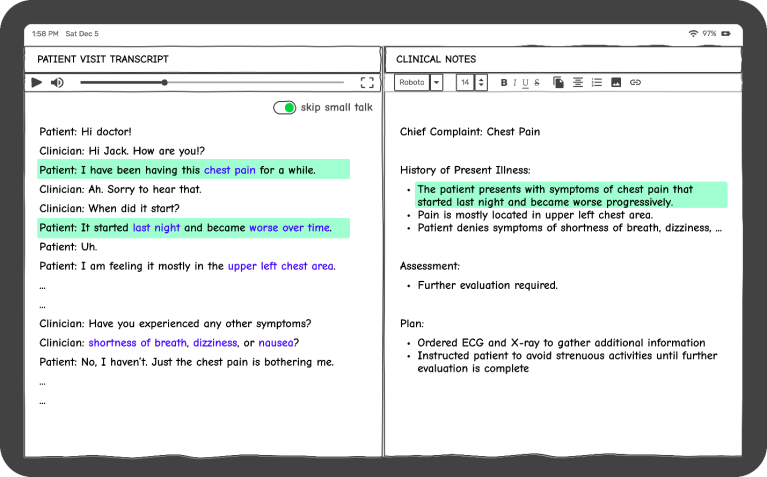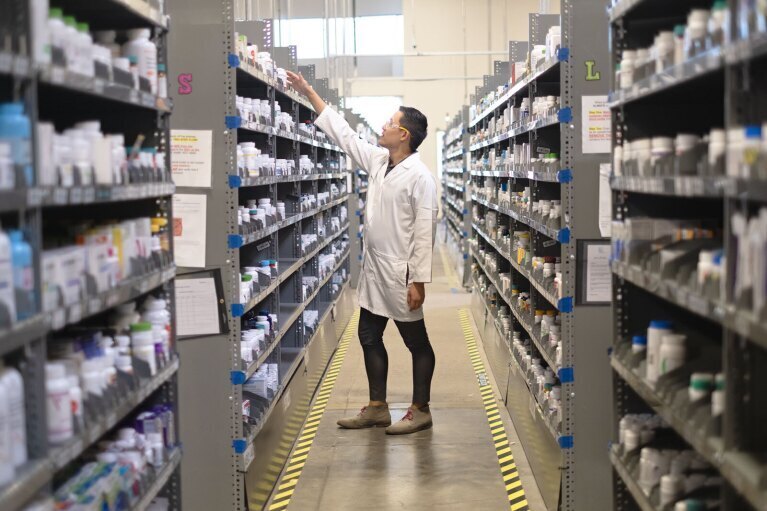Page overview
Empowering more efficient, connected health visits
Health care visits give clinicians an opportunity to actively engage with patients. But the critical need to capture detailed notes during appointments often diverts attention away from meaningful patient-clinician conversation. Amazon is developing artificial intelligence solutions, like HealthScribe, a HIPAA-eligible service that uses generative AI to automatically create clinical notes from doctor-patient conversations.

The AI-generated notes cite every detail directly from the recorded conversation transcript for transparency. Doctors can quickly review and approve the notes before entering them into health records, saving valuable time while ensuring accuracy. Health care software providers are also integrating HealthScribe to bring this game-changing capability into their applications. The result is more efficient, collaborative, and satisfying visits for clinicians and patients alike.
Bringing a new drug to market is time and cost intensive, taking an average of 10 to 15 years. One way AWS helps life sciences organizations accelerate this process is by providing researchers with access to the latest generative AI advancements so they can find the answers they need faster. Recently, AWS announced a collaboration with EvolutionaryScale, a frontier AI research lab dedicated to advancing biological research and life sciences. With this collaboration, EvolutionaryScale’s ESM3, a frontier, state-of-the-art language model family, will be made available on AWS, enabling researchers and scientists to create entirely new proteins that have not existed in nature, potentially reducing the cost and time of bringing new therapeutics to market by years and millions of dollars.
Amazon Pharmacy leverages generative AI to fill prescriptions more quickly and accurately, make customer service faster and more helpful, and ensure the right quantities of medications are stocked for customers. Amazon Pharmacy is also working on AI applications that provide more transparent pricing on prescription medications, enabling customers to shop for the best price. This eliminates the need for customers to spend time waiting in long lines at the pharmacy, and allows them to get the medications they need, from the comfort of their home.
Amazon Pharmacy is also harnessing the power of machine learning and generative AI to provide real-time estimated pricing for prescription medications based on your insurance, without you needing to enter insurance details. This approach allows customers to easily compare pricing options upfront, including insurance estimates, Prime savings, RxPass subscriptions, and automatic coupons, enabling better informed decisions when shopping for medications.

While there may be some truth to the notion that doctors' handwriting can sometimes be difficult to read, most prescriptions today are typed and sent electronically by your doctor's office. However, even digital prescriptions can contain confusing or inconsistent instructions. That's why Amazon Pharmacy uses advanced technology to accurately capture all the details from your prescription. We utilize AWS Textract, a computer vision service that automatically extracts printed text, handwriting and data from virtually any document to accurately capture prescription details. This makes the directions on your prescription more clear and structured, allowing our pharmacists to fill your medications quickly and accurately, while reducing potential errors.
Our pharmacists still carefully review every prescription because sometimes provider instructions may be incorrect in ways that technology cannot detect. But by combining cutting-edge AI with professional pharmacist expertise, Amazon Pharmacy can process orders 90% faster than traditional methods, while most importantly, reducing the chance of mistakes with your medication. We're committed to making your pharmacy experience as safe and convenient as possible.
Amazon is committed to developing AI responsibly, taking a people-centric approach that prioritizes education, science, and customers. This ethical framework guides our health care partnerships. For example, Amazon Health Services and AWS collaborate with leading health care systems—including Advocate, Mass General and Mount Sinai; insurers—including Blue Shield and Prime Therapeutics; and life sciences companies—including Pfizer and Gilead to explore how AI can enhance patient experiences and outcomes. We’re focused on using machine learning to uncover valuable patient insights, while ensuring stringent privacy and security protocols. Computer vision and natural language processing are deployed to automate tedious administrative tasks, so health care professionals can focus on patient care.












